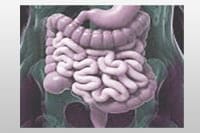 |
IBS and role of probiotics, prebiotics, and antibiotics |
| Prebiotics and synbiotics in IBS: Currently there is insufficient evidence to recommend prebiotics or synbiotics in IBS. Recommendation: weak. Quality of evidence: very low. 3
Definitions:
Probiotics in IBS: 3 Findings:
Definition:
Antibiotic therapy in IBS patients: Findings from the American College of Gastroenterology:
Findings from the American Gastroenterological Association regarding Rifaximin:7
Source: Xifaxan® (rifaxamin) package insert. Salix Pharmaceuticals, Bridgewater, NJ 08807 USA. Rev. 11/2015. Acccessed: July 2017
|
References |
IBS and role of probiotics, prebiotics, and antibiotics
Reference(s)
National Institutes of Health, U.S. National Library of Medicine, DailyMed Database.
Provides access to the latest drug monographs submitted to the Food and Drug Administration (FDA). Please review the latest applicable package insert for additional information and possible updates. A local search option of this data can be found here.

